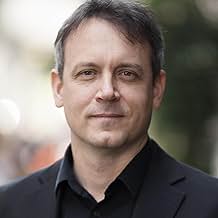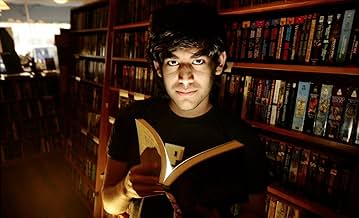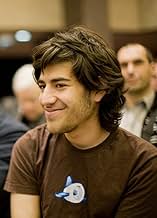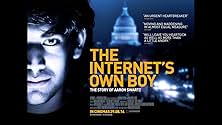The story of programming prodigy and information activist Aaron Swartz, who took his own life at the age of 26.The story of programming prodigy and information activist Aaron Swartz, who took his own life at the age of 26.The story of programming prodigy and information activist Aaron Swartz, who took his own life at the age of 26.
- Awards
- 4 wins & 4 nominations total
Aaron Swartz
- Self
- (archive footage)
Stephen Heymann
- Self - Asst. U.S. Attorney Massachusetts
- (archive footage)
- Director
- Writer
- All cast & crew
- Production, box office & more at IMDbPro
Featured reviews
This is a very good documentary of a subject that EVERYONE should be interested in. If you're interested in the Internet, technology, open publishing (science or law), or freedom, you MUST watch this documentary. It's a moving and disturbing story of a very important young man, and how the government tried to make an example out of him.
Where it fails, is dealing with Aaron's mental health issues. His struggles with depression (which he documented in his blog) were glossed over, and even dismissed (such as when he brother said he didn't remember any mood swings as a child). I think this was purposefully done to fit the thesis of the documentary (that the prosecution backed him into a corner), and ignores a major part of Aaron's life. Just because he was "at-risk" due to mental illness, doesn't mean he wasn't targeted and persecuted. Instead, his depression was swept under the rug by the filmmaker, as it so often is in our society.
Overall, this is a very important film and I would highly recommend it. However, read Aaron's blogs and writings for supplemental info!
Where it fails, is dealing with Aaron's mental health issues. His struggles with depression (which he documented in his blog) were glossed over, and even dismissed (such as when he brother said he didn't remember any mood swings as a child). I think this was purposefully done to fit the thesis of the documentary (that the prosecution backed him into a corner), and ignores a major part of Aaron's life. Just because he was "at-risk" due to mental illness, doesn't mean he wasn't targeted and persecuted. Instead, his depression was swept under the rug by the filmmaker, as it so often is in our society.
Overall, this is a very important film and I would highly recommend it. However, read Aaron's blogs and writings for supplemental info!
In a world where idealism is a scarce commodity, Aaron Swartz stood out. A computer programmer and political and social activist, Aaron had a quaint goal — to make the world a better place, to help us live our lives so that they make a difference. Ultimately, however, though he tried to save the world, he could not save himself. On January 11, 2013, Swartz, age 26, hanged himself in his New York apartment, after having been vigorously pursued by the U.S. Department of Justice for two years for hacking MIT's computer network and downloading 4.8 million documents from the JSTOR database, a private corporation that charged exorbitant fees for non-subscribers to view online research.
Swartz's story is told in a deeply moving and very disturbing documentary The Internet's Own Boy: The Story of Aaron Swartz, directed by Brian Knappenberger. The film traces Swartz' life from the time he was a three-year-old prodigy able to read a meeting notice posted on the refrigerator to his later years when he created the prototype for Wikipedia, helped start up RSS and Reddit and wrote specifications for Creative Commons, an organization devoted to enabling the free distribution of an otherwise copyrighted work. Wherever he was, however, he challenged the system and the corporate organizational structure whether it was in high school, Stanford University, or Silicon Valley.
Though the film does not break new ground stylistically, the interviews with Aaron's family, girlfriends, and friends such as Net activists Tim Berners-Lee who created the World Wide Web and author Cory Doctorow are illuminating and often inspiring. Some of the best scenes are Swartz's political campaign to defeat SOPA, the Stop Online Piracy Act introduced in Congress and expected to pass. He galvanized the opposition with creative use of the Internet to ultimately defeat a bill he thought would restrict Internet freedom. He also worked for now Senator Elizabeth Warren, one of the few progressive voices in our politics.
Swartz defended his action in hacking MIT's computers in a manifesto that read in part, "Information is power. But like all power, there are those who want to keep it for themselves. The world's entire scientific and cultural heritage, published over centuries in books and journals, is increasingly being digitized and locked up by a handful of private corporations. Want to read the papers featuring the most famous results of the sciences? You'll need to send enormous amounts to publishers like Reed Elsevier." In the tradition of Thoreau, he said, "There is no justice in following unjust laws. It's time to come into the light and, in the grand tradition of civil disobedience, declare our opposition to this private theft of public culture." While Aaron's decision to free scholarly works from MIT from private corporate control may have been ill-advised, the government's treatment of him as a dangerous criminal was unwarranted and out of proportion to the crime. Originally indicted on four counts, after his SOPA campaign was successful, Carmen Ortiz, U.S. Attorney for the district of Massachusetts, upped the number of counts to thirteen to "send a message." She accused Swartz of violating Title 18 of the U.S. Code, which carries a maximum penalty of 50 years in jail and one million dollars in fines.
Ortiz who pursued the case even after JSTOR agreed to drop the charges, justified the indictment by saying, "stealing is stealing whether you use a computer command or a crowbar, and whether you take documents, data, or dollars." Attorney General Eric Holder defended Ortiz's prosecution before the Senate Judiciary Committee, terming it, "a good use of prosecutorial discretion." After Swartz' death, Ortiz issued a statement saying that her office had never intended to seek maximum penalties against him, a small consolation to Swartz' family.
In contrast, the U.S. Department of Justice never intended to seek ANY penalties against those responsible for the financial manipulations and fraud that wiped out the jobs and living standards of millions of people. The Internet's Own Boy: The Story of Aaron Swartz is not just an advocacy film, but a character study of a young man who was not afraid to challenge what he thought was an unjust system. A clip is shown of Swartz saying, "I think you should always be questioning, I take this very scientific attitude in which everything you've learned is just provisional, that it's always open to recantation, refutation I think the same thing applies to society." As a fitting epitaph to Aaron's life, author Justin Peters, recalled an event held one week after his death. A large banner was spread out on a table where people recorded memories of Aaron and messages of condolence. According to Peters, "near the end of the night, a slender boy in a plain sweatshirt who looked too young to be there came over to the table. He uncapped a marker. He wrote simply, 'We will continue.'"
Swartz's story is told in a deeply moving and very disturbing documentary The Internet's Own Boy: The Story of Aaron Swartz, directed by Brian Knappenberger. The film traces Swartz' life from the time he was a three-year-old prodigy able to read a meeting notice posted on the refrigerator to his later years when he created the prototype for Wikipedia, helped start up RSS and Reddit and wrote specifications for Creative Commons, an organization devoted to enabling the free distribution of an otherwise copyrighted work. Wherever he was, however, he challenged the system and the corporate organizational structure whether it was in high school, Stanford University, or Silicon Valley.
Though the film does not break new ground stylistically, the interviews with Aaron's family, girlfriends, and friends such as Net activists Tim Berners-Lee who created the World Wide Web and author Cory Doctorow are illuminating and often inspiring. Some of the best scenes are Swartz's political campaign to defeat SOPA, the Stop Online Piracy Act introduced in Congress and expected to pass. He galvanized the opposition with creative use of the Internet to ultimately defeat a bill he thought would restrict Internet freedom. He also worked for now Senator Elizabeth Warren, one of the few progressive voices in our politics.
Swartz defended his action in hacking MIT's computers in a manifesto that read in part, "Information is power. But like all power, there are those who want to keep it for themselves. The world's entire scientific and cultural heritage, published over centuries in books and journals, is increasingly being digitized and locked up by a handful of private corporations. Want to read the papers featuring the most famous results of the sciences? You'll need to send enormous amounts to publishers like Reed Elsevier." In the tradition of Thoreau, he said, "There is no justice in following unjust laws. It's time to come into the light and, in the grand tradition of civil disobedience, declare our opposition to this private theft of public culture." While Aaron's decision to free scholarly works from MIT from private corporate control may have been ill-advised, the government's treatment of him as a dangerous criminal was unwarranted and out of proportion to the crime. Originally indicted on four counts, after his SOPA campaign was successful, Carmen Ortiz, U.S. Attorney for the district of Massachusetts, upped the number of counts to thirteen to "send a message." She accused Swartz of violating Title 18 of the U.S. Code, which carries a maximum penalty of 50 years in jail and one million dollars in fines.
Ortiz who pursued the case even after JSTOR agreed to drop the charges, justified the indictment by saying, "stealing is stealing whether you use a computer command or a crowbar, and whether you take documents, data, or dollars." Attorney General Eric Holder defended Ortiz's prosecution before the Senate Judiciary Committee, terming it, "a good use of prosecutorial discretion." After Swartz' death, Ortiz issued a statement saying that her office had never intended to seek maximum penalties against him, a small consolation to Swartz' family.
In contrast, the U.S. Department of Justice never intended to seek ANY penalties against those responsible for the financial manipulations and fraud that wiped out the jobs and living standards of millions of people. The Internet's Own Boy: The Story of Aaron Swartz is not just an advocacy film, but a character study of a young man who was not afraid to challenge what he thought was an unjust system. A clip is shown of Swartz saying, "I think you should always be questioning, I take this very scientific attitude in which everything you've learned is just provisional, that it's always open to recantation, refutation I think the same thing applies to society." As a fitting epitaph to Aaron's life, author Justin Peters, recalled an event held one week after his death. A large banner was spread out on a table where people recorded memories of Aaron and messages of condolence. According to Peters, "near the end of the night, a slender boy in a plain sweatshirt who looked too young to be there came over to the table. He uncapped a marker. He wrote simply, 'We will continue.'"
This non-fictional film documents the devastating and mortifying story of the the late Aaron Swartz and his battle with politics and the US justice system. It's heartwarming, funny, and tearful. You'll need to sit down to watch this one.
Anyone that uses computers should watch this film!
The film implied important questions:
1. Do computer users have any rights in the United States at all? If not, do the lawmakers not know enough about computers to make them?
2. Why do US Federal prosecutors threaten computer users when the "injured parties" state that they do not seek prosecution?
3. Why does a university like MIT not protect the fundamental rights of its students?
4. Isn't the primary role of a university to protect and nourish the fundamental rights of students before teaching can occur?
5. How much of Aaron's prosecution was based on legal precedent and how much of it was politically motivated?
6. Should any amount of politics be tolerable in a legal case where someone's life is on-the-line?
7. Why is the U.S. secret service prosecuting civilians in matters not related to national security?
I cannot begin to answer these questions by myself, but someone much smarter than me, like Aaron, may have been able to.
Computer experts have historically been blamed for the mistakes of others that did not know what they were doing with technology. Experts are threatened, scared into submission, and punished for the smallest infraction. Schools, governments, and everyday people are scared of computer experts and the power they command.
This movie leads one to believe that the nation's leaders are letting their fears control their decisions about technology instead of seeking out the experts and being open about their policies. This film covers all of this and more.
It most importantly serves as Aaron's story. Aaron is portrayed as a brilliant young computer expert that won't give up. It shows Aaron from a young age up until his last moments. His family, his friends, dreams and aspirations are all present. It shows his success at business and his genius. The filmmakers did an amazing job in making this beautiful film. This a tribute to Aaron's life and work.
I highly recommend watching this film.
Anyone that uses computers should watch this film!
The film implied important questions:
1. Do computer users have any rights in the United States at all? If not, do the lawmakers not know enough about computers to make them?
2. Why do US Federal prosecutors threaten computer users when the "injured parties" state that they do not seek prosecution?
3. Why does a university like MIT not protect the fundamental rights of its students?
4. Isn't the primary role of a university to protect and nourish the fundamental rights of students before teaching can occur?
5. How much of Aaron's prosecution was based on legal precedent and how much of it was politically motivated?
6. Should any amount of politics be tolerable in a legal case where someone's life is on-the-line?
7. Why is the U.S. secret service prosecuting civilians in matters not related to national security?
I cannot begin to answer these questions by myself, but someone much smarter than me, like Aaron, may have been able to.
Computer experts have historically been blamed for the mistakes of others that did not know what they were doing with technology. Experts are threatened, scared into submission, and punished for the smallest infraction. Schools, governments, and everyday people are scared of computer experts and the power they command.
This movie leads one to believe that the nation's leaders are letting their fears control their decisions about technology instead of seeking out the experts and being open about their policies. This film covers all of this and more.
It most importantly serves as Aaron's story. Aaron is portrayed as a brilliant young computer expert that won't give up. It shows Aaron from a young age up until his last moments. His family, his friends, dreams and aspirations are all present. It shows his success at business and his genius. The filmmakers did an amazing job in making this beautiful film. This a tribute to Aaron's life and work.
I highly recommend watching this film.
I don't know why the Aaron Swartz story was never on my radar, which is one of the reasons why The Internet's Own Boy was an eye-opener. His is a tragic story, and although the filmmakers secured screen time with (almost) all involved, it's sad that all we have from Swartz is archival webcam interview footage. The movie makes a persuasive case for his being made a high-profile example by the justice system, and there's enough here to leave you either irate or fearful (or both).
Whether or not you agree with the man's politics, he made a difference - hell, he was instrumental in getting SOPA struck down, so he deserves our respect for that - and his story brings to light the need for fine-tuning the ancient copyright laws. Either way, this documentary delivers.
7/10
Whether or not you agree with the man's politics, he made a difference - hell, he was instrumental in getting SOPA struck down, so he deserves our respect for that - and his story brings to light the need for fine-tuning the ancient copyright laws. Either way, this documentary delivers.
7/10
Orin Kerr, professor and former federal prosecutor, describes the motivation of the government's case as their fear that, as stated in his "Open Access Manifesto", Aaron believed it was a moral imperative to be committed to breaking the law to overcome a law that was unjust, and that, if allowed to succeed in "nullifying" the law, that everyone would have access to the data base and therefore "the toothpaste would be out of the tube" and somehow chaos would ensue, or as he phrases it, "Swartz's side would win". Apparently, free access to scholarly and scientific journals must be restricted to protect the people from themselves.
There is also the issue of civil disobedience in general and the ways those in power portray such actions and those who encourage them. As one other reviewer here states, "when you commit an act of criminal civic disobedience, you should do so accepting that you will most likely pay the price for that action". That is true, however, as Gilbert and Sullivan suggested, the punishment should fit the crime, especially when, as in this case, the "crime" is questionable at best. I wonder how the current US administration would view the acts of Gandhi or Mandela were they occurring now and posing a threat to their political status quo and not seen safely through the rear view mirror of history. It wasn't that long ago that many in power in America considered Mandela , in particular, a "terrorist".
This excellent documentary is a cautionary tale that all free thinking and well meaning people must see and understand. Secrecy is power and governments will do whatever they can to protect it. As Aaron himself suggested, this is a battle that will never be won, but can never be abandoned.
See this film.
There is also the issue of civil disobedience in general and the ways those in power portray such actions and those who encourage them. As one other reviewer here states, "when you commit an act of criminal civic disobedience, you should do so accepting that you will most likely pay the price for that action". That is true, however, as Gilbert and Sullivan suggested, the punishment should fit the crime, especially when, as in this case, the "crime" is questionable at best. I wonder how the current US administration would view the acts of Gandhi or Mandela were they occurring now and posing a threat to their political status quo and not seen safely through the rear view mirror of history. It wasn't that long ago that many in power in America considered Mandela , in particular, a "terrorist".
This excellent documentary is a cautionary tale that all free thinking and well meaning people must see and understand. Secrecy is power and governments will do whatever they can to protect it. As Aaron himself suggested, this is a battle that will never be won, but can never be abandoned.
See this film.
Did you know
- Quotes
First Title Cards: Unjust Laws exist; shall we be content to obey them, or shall we edeavor to amend them, and obey them until we have suceeded, or shall we transgress them at once?- Henry David Thoreau
- ConnectionsFeatures The Wizard of Oz (1939)
- SoundtracksExtraordinary Machine
Written and Performed by Fiona Apple
- How long is The Internet's Own Boy: The Story of Aaron Swartz?Powered by Alexa
Details
- Release date
- Country of origin
- Official site
- Language
- Also known as
- Internets underbarn
- Production companies
- See more company credits at IMDbPro
Box office
- Gross US & Canada
- $48,911
- Opening weekend US & Canada
- $21,705
- Jun 29, 2014
- Gross worldwide
- $48,911
- Runtime
- 1h 45m(105 min)
- Color
- Aspect ratio
- 1.78 : 1
Contribute to this page
Suggest an edit or add missing content































